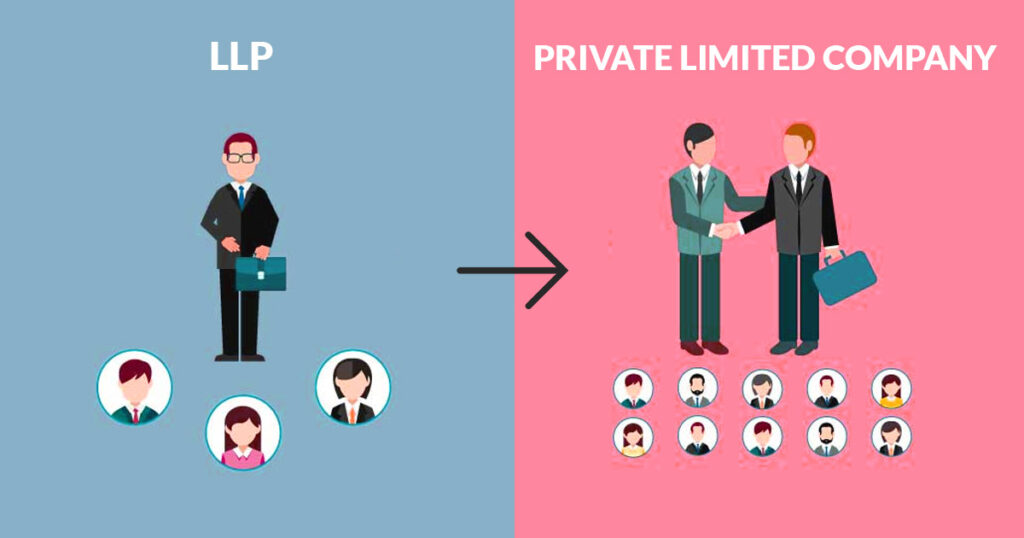What is the Process of LLP to Company Conversion?
Introduction
Limited Liability Partnerships (LLPs) are a popular business structure in India, providing the benefits of both partnerships and limited liability companies. However, as businesses expand, they may require additional capital, greater credibility, or a different legal structure to attract investors. In such cases, converting an LLP into a Private Limited Company (PLC) becomes a strategic move. This article explores the process, benefits, limitations, and key differences involved in LLP to company conversion.
Definition
LLP to Company conversion refers to the legal process of transforming a Limited Liability Partnership into a Private Limited Company under the provisions of the Companies Act, 2013. This conversion allows businesses to enjoy the advantages of a corporate structure while retaining their existing operations.
Application Process for LLP to Company Conversion
Approval from Partners:
- Obtain consent from all LLP partners through a resolution.
Name Reservation:
- Apply for the reservation of the company’s name through the RUN (Reserve Unique Name) service of the Ministry of Corporate Affairs (MCA).
Application for DSC & DIN:
- Obtain Digital Signature Certificates (DSC) for the proposed directors.
- Apply for Director Identification Number (DIN) for those who don’t have one.
Drafting MOA and AOA:
- Prepare the Memorandum of Association (MOA) and Articles of Association (AOA) as per the Companies Act, 2013.
Filing of Conversion Form:
- Submit Form URC-1 along with necessary documents such as:
- LLP Agreement
- Statement of Assets and Liabilities
- List of partners and directors
- No Objection Certificate (NOC) from creditors
Incorporation Approval:
- Upon verification, the Registrar of Companies (ROC) grants approval for conversion and issues a Certificate of Incorporation.
Post-Conversion Compliance:
- Update PAN, GST, and bank details.
- Inform statutory authorities about the conversion.
Benefits of Converting LLP to Private Limited Company
- Limited Liability Protection: The liability of shareholders is limited to the unpaid amount of their shares.
- Increased Credibility: A private limited company enjoys higher trust among investors, clients, and financial institutions.
- Ease of Fundraising: Companies can raise capital through equity funding, which is not possible for LLPs.
- Better Governance: Companies are governed by the Companies Act, 2013, ensuring a structured legal framework.
- Expansion Opportunities: The corporate structure allows for easier mergers and acquisitions.
Limitations of LLP to Company Conversion
- Higher Compliance Costs: Companies have more stringent compliance requirements than LLPs.
- Tax Implications: The conversion may have tax consequences, including stamp duty on asset transfer.
- Loss of LLP Benefits: LLPs have fewer compliance burdens and are tax-efficient for certain businesses.
- Time-Consuming Process: The legal formalities for conversion can take weeks or months to complete.
Comparative Table: LLP vs Private Limited Company
| Feature | LLP | Private Limited Company |
|---|---|---|
| Legal Structure | Hybrid of partnership & company | Separate legal entity |
| Liability | Limited to partners’ contributions | Limited to share capital |
| Compliance Requirements | Lower | Higher |
| Fundraising Options | Restricted | Can raise equity capital |
| Tax Benefits | Beneficial for small businesses | Corporate tax structure |
| Governance | Flexible | Strict as per Companies Act |
Conclusion
Converting an LLP into a Private Limited Company is a strategic decision for businesses looking to scale, attract investments, and enhance credibility. While the process involves regulatory approvals and compliance obligations, the long-term benefits of corporate structure outweigh the challenges. Before proceeding with conversion, it is advisable to consult legal and financial experts to ensure a seamless transition.
To visit https://www.mca.gov.in
FAQs
For further details access our website https://vibrantfinserv.com

